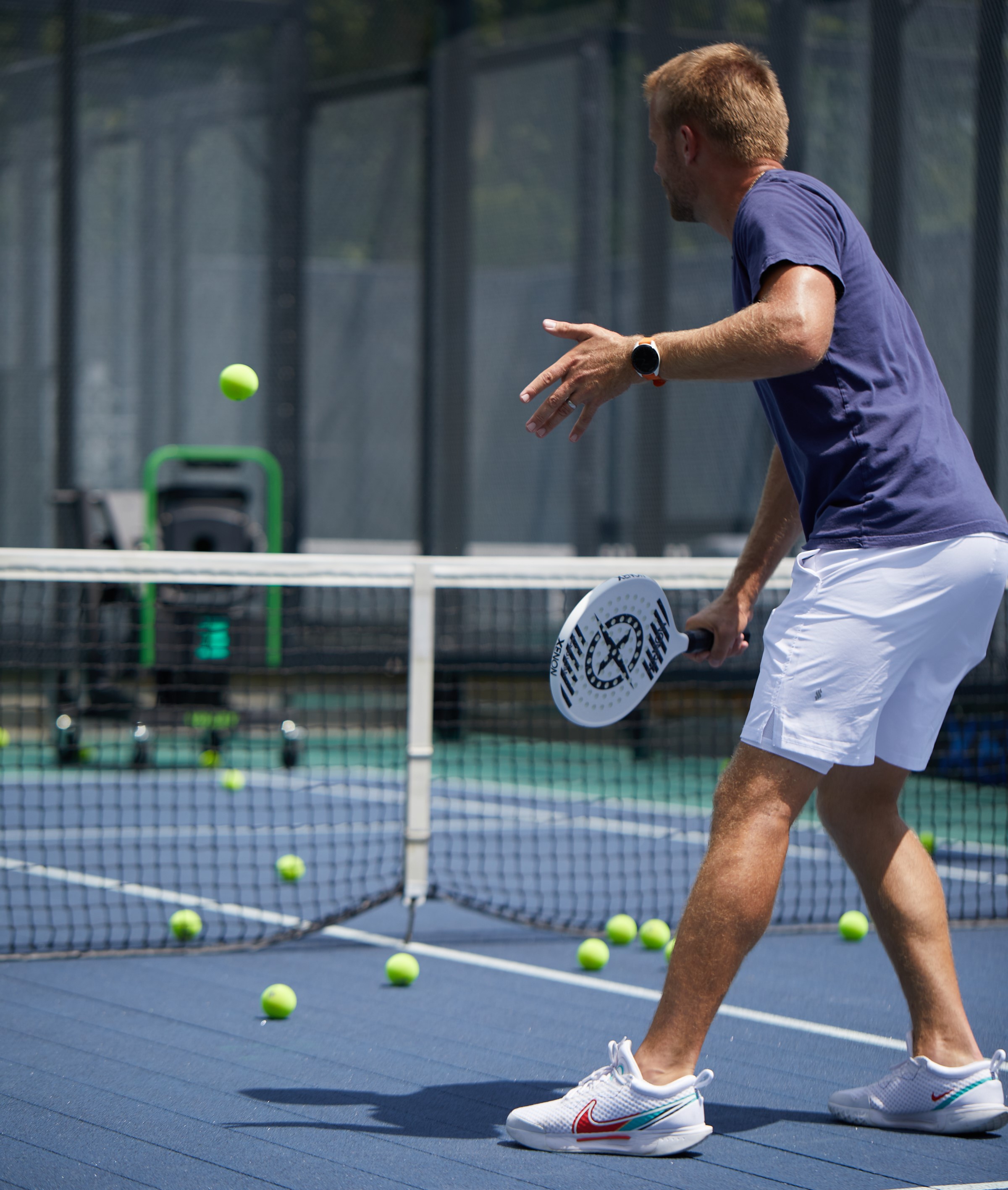Four Things Every Paddle Player Needs to Be Doing in the Off-Season

If you’re like most platform tennis players, you are probably shaking up your sports routine now that summer is in full swing, shifting gears to tennis, pickleball, or golf. Taking a break from paddle is not only common, but as a paddle pro, it’s something I recommend and do myself. Nevertheless, in order to stay in peak shape for the next season, there are a few key things that you should be incorporating into your schedule in the interim.
1. Don’t Abandon Paddle Completely
It's no secret—most players I work with admit they don't touch a paddle all summer. While the off-season is short, completely stepping away can set you back more than you think. Many players realize too late that they can't just pick up where they left off.
To keep your game from slipping, aim to play at least once a week. Even occasional court time helps maintain your timing, footwork, and feel for the game. When fall rolls around, you'll be glad you stayed connected—it'll make the transition back to competitive play much smoother.
2. Supplement Play with Strength & Stability and Cross-Over Training
I cannot emphasize enough how beneficial cross-over training with another racquet sport is. In addition to my regular training during paddle season, I also play tennis, which helps tremendously with my drives and returns. Getting more touches and extra reps driving the ball will have a positive impact on your game by helping you to think more creatively and bring a new perspective.
But cross-training isn’t limited to racquet sports. Off-season is also the ideal time to engage in other dynamic sports like basketball, ultimate frisbee, or soccer. These sports mimic paddle’s quick changes of direction and explosive movement, keeping your footwork sharp and your agility intact.
Paddle places a high demand on specific areas of the body—especially the shoulders, back, hips, glutes, and knees. That’s why building and maintaining strength in these key zones should be a top priority during the off-season. Many common injuries stem not from overuse, but from under-preparation: weak stabilizers, poor mobility, or skipping warm-ups altogether.
Off-season is the perfect time to build a stronger foundation. Incorporate targeted strength and stability work into your routine—think resistance band exercises for shoulder health, planks for core control, balance work with a BOSU ball, and lower body staples like lunges and squats. These movements will not only make you more resilient but also improve your balance, agility, and ability to change direction quickly—all essential for staying fast and injury-free on the court.
3. Use a Racquet Sports Trainer to Elevate Your Game
Players often tell me they want to refine their strokes or experiment with new shots during the season, but I always advise against it. Why? Because real improvement usually follows a “one step backward, two steps forward” pattern. Anytime you tweak your technique, there’s an adjustment phase before you see results—something that can cost you matches if you’re making changes mid-season.
That’s why the downtime between seasons is the perfect time to experiment, refine, and level up your game. And one of the best ways to do that? A racquet sports trainer like Volley.
This isn’t your average ball machine. Volley is an AI-powered trainer that lets you dial in exactly what you want to work on—whether it’s drives, volleys, lobs, or tricky off-speed shots. It replicates real-life match scenarios, so you’re not just hitting mindless balls—you’re developing muscle memory, refining mechanics, and gaining confidence in shots you might not try during live play.
The beauty of training with Volley is that there’s zero pressure—no partner, no opponent, no scoreboard. You can take risks, get uncomfortable, and push yourself in ways that simply aren’t possible in a match. By the time the season starts, those once-risky shots will feel second nature, giving you a real edge when you’re back on the court.
4. Challenge Your Paddle Game with New Partners
The off-season isn’t just a time to refine your shots—it’s also the perfect opportunity to mix things up by playing with new partners. It’s easy to fall into familiar patterns with a regular teammate, developing strategies that work well together. But what happens when you step on the court with someone new?
Playing with a variety of partners—lefties, righties, and players from different clubs—challenges you to adapt. The strategies that worked with your usual partner might not be as effective, forcing you to adjust your positioning, shot selection, and overall game awareness. These new experiences broaden your perspective, helping you develop skills and instincts that make you a more versatile, well-rounded player when the season starts again.
Train Smarter This Summer with Volley
Summer is a great time to relax, recharge, and enjoy the sports and activities you love—but it’s also the perfect opportunity to quietly sharpen your paddle game. Whether it’s staying connected with weekly hits, experimenting with new shots on your own, or playing with different partners, the off-season gives you the freedom to improve without the pressure of competition.
If you're curious about how to make the most of that time, consider trying a racquet sports trainer like Volley. It’s a great way to get high-quality reps and refine your game in a focused, low-pressure environment. Don’t have one at your club yet? Reach out—we’re happy to help you find a trainer near you or explore how to bring one to your facility.